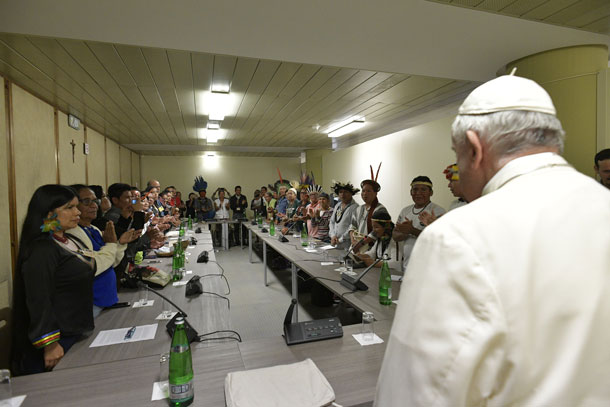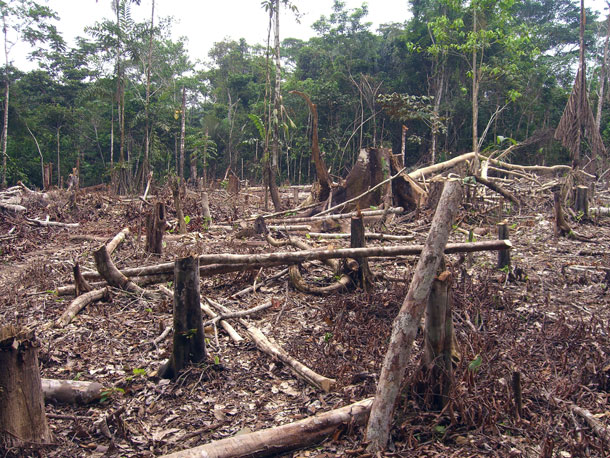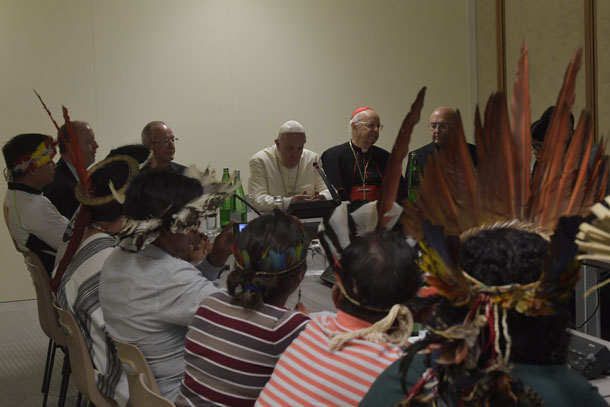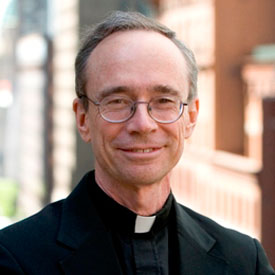Pope Hosts Amazon Synod
Air Date: Week of November 1, 2019

The Amazonian Synod united Catholic and indigenous leaders from the nine countries surrounding the Amazon Basin, Bolivia, Brazil, Colombia, Ecuador French Guiana, Guyana, Peru, Venezuela and Suriname. (Photo: Courtesy of Vatican Media)
Pope Francis recently called the bishops of the Amazon to Rome for a synod to bring them together with lay members of the indigenous community to address human rights, climate change and deforestation. And there is such an acute shortage of priests in Latin America, the synod ended up calling for allowing priests to marry and the ordination of women as deacons to have a more effective response to the Amazon crisis. Father Thomas Reese, author of Inside the Vatican, joins Host Steve Curwood to discuss.
Transcript
CURWOOD: Pope Francis recently called the bishops of the Amazon to Rome for a council or Synod bringing bishops together with lay members of the indigenous community. High on the agenda were discussions about human rights, climate change and deforestation. And there is such an acute shortage of priests in Latin America, the synod ended up calling for allowing priests to marry and the ordination of women as deacons to have a more effective response to the Amazon crisis. Joining us now from Washington DC is Father Thomas Reese, Author of Inside the Vatican.
Father Reese welcome to Living on Earth!
REESE: Thank you Steve, good to be with you.
CURWOOD: So what were the major issues discussed at the Amazonian Synod?
REESE: Well, there were really three major issues that the Synod focused on. First was the incredible damage that's being done to the rain forest to the environment in the Amazon region. This is being done by economic interests that want to cut down the trees for lumber, and that want to clear forest for cattle ranches, that want to mine the precious minerals and oil that are in the Amazon region. And all of these economic interests are pushing for this and benefiting from it, but it's really not helping the people of the Amazon themselves. In fact, that's the second issue that the Synod was focused on, the violation of the human rights of the Amazonian people, of the indigenous people that lived there. Their land is being stolen from them. They are being driven out of their territories by criminal gangs. People who stand up to defend the rights of the Amazonian people are being murdered, are being killed. And finally, the bishops, well, they kind of realize that they need to update the way in which the gospel is being preached by the Catholic Church and how we are bringing the Gospel to the Amazon region. In the past, we really acted like colonial powers. We came in and tried to turn the Amazonian people into little Europeans, instead of allowing them to create a Catholic culture that reflected their own culture that reflected their own values, their own symbols, their way of worshiping, and so the bishops talked a lot about that how to have the Catholic Church “enculturated”, is the term they used, in the culture of the people of the Amazon. So those were the three big topics that they focused on.
CURWOOD: So this raises the question then, of who is leading the congregations, is leading the parishes there? A couple of different ways one, of course involves gender? I mean, typically when one goes to Latin America, one will find sisters pretty much running a parish. How did this come out of the Synod?
REESE: Well, you're absolutely right. This is an incredibly important question. Because many of these communities don't see a priest except once, twice a year. So there's nobody there to celebrate the Eucharist, there's nobody there to hear confessions, there's nobody there to anoint the sick, or do any of these kinds of things. So in these places that don't have priests, what happens? Well, the lay people step forward to be the leaders in the community and most of the time, frankly, it's lay women who step forward to teach the children about their faith, to lead discussions of the gospel of the Scripture. So, there is this great need for priests. The Catholic Church has to decide which is more important: having the Eucharist in the Christian community, in the Catholic community in the Amazon, or having a celibate priesthood. Because there simply are not enough people stepping forward, who are willing to live a celibate life as priests. So the bishops at the synod recommended that the Pope allow men of proven virtue that are married, to be ordained as priests so that they can serve these communities. And the Pope, he has a commission that he appointed already to study the possibility of having women deacons. This is the first time in almost 1000 years in which a church entity like a synod has made this kind of a recommendation. So we're hoping that the pope will listen to this and respond to it.
CURWOOD: Talk to me about the next steps. I gather there's some kind of a council that has been put together to implement what the Synod is talking about.

Deforestation, including aggressive slash-and-burn, has destroyed nearly one-fifth of the Amazon rainforest. (Photo: Matt Zimmerman, Flickr, CC By 2.0)
REESE: The Pope made very clear that the synod is not the end of the process. It's part of the process. He wants this to continue first of all down in the Amazon itself, with the bishops, consulting with their people, listening to their people. The synod established a synodal Council. This is to help the Pope in his response, and the Pope said that he hopes to respond to what the synod said before the end of the year. So that's, it’s not a piece of paper. That's the most important thing. You know, the last thing we need is another piece of paper, what we need now are actions, actions that people can take to preserve the environment. For example, one of the points they made very strongly was, you know that the people in the Western world, the people in the development world, and by that they meant Europe, America, North America, China and Japan, that people there have to change their lifestyles. They have to start eating less meat, they have to stop, you know, consuming all of the lumber that comes out of the Amazon. They have to stop lusting for the gold and the precious minerals that are coming out of the Amazon, because the Amazonian people cannot save the forest on their own, unless the lifestyles of the people in the development world and that means people listening to this program. Unless that changes, we're headed towards disaster of apocalyptic proportions.
CURWOOD: There's the question of these murders of people who are protecting the environment the rain forest, communities there in the Amazon. How does the Catholic Church propose fighting these murders?
REESE: Well, this is something that the bishops were very concerned about. Because remember, these bishops are from the Amazon region itself. So they're talking about personal experience. They've seen the destruction of the Amazon forest, and they've seen the killing of their people who have stood up for their rights. In fact, at the Amazon Synod, they had a lay woman whose husband had been murdered, for standing up for his rights. So the bishops are very concerned about this. And what are they going to do? They're going to speak out, they're going to raise a prophetic voice saying that the killing must stop, the stealing of indigenous territories must stop. They are forming lobby groups where they can speak with one voice on the international level condemning this and on the national level in their own countries, and they're demanding that the Brazilian government fully fund the operations they have for investigating these kinds of abuses. You know, they, they just simply have not put the resources into tracking down the murderers, or in protecting the rain forests. And of course, it's even worse under the current president who wants to continue chopping down the rain forest and exploiting its resources.

The closing document from the Amazon synod, the Instrumentum Laboris, touches on issues of colonialism, ecology and environmentalism, syncretism of Catholicism with indigenous tradition, amongst other themes. (Photo: Courtesy of Vatican Media)
CURWOOD: What about the conditions for the indigenous women in the Amazon? I understand that they’re in a lot of risk.
REESE: Yeah, I mean, it's always women and children who suffer the most when there is this kind of exploitation. Basically, what has happened is economic interests have chased these people either deeper into the jungles, or they have forced them to migrate to cities where they have hardly any opportunities. Sometimes they don't even know the local language. They don't know Spanish or Portuguese. Sometimes they come in there, they don't have education. And so they're really subject to exploitation to trafficking, both sex trafficking and for domestic servitude. So it's really, really sad. And it's, it's tragic.
CURWOOD: Let me ask you about Jair Bolsonaro, the president of Brazil, who has taken many steps to marginalize indigenous groups even more than they are and to push for further development in the Amazon in the agricultural type. To what extent is the pope communicating with President Bolsonaro, about deforestation and indigenous rights?
REESE: Oh, the Pope is obviously, has been very clear about this, the importance of protecting indigenous rights and the importance of protecting the environment. I mean, he's been really strong on this since his Encyclical Laudato si’, which talked about protecting the environment and protecting the indigenous peoples. So he's been very vocal on this. The bishops in the Amazon region have also. But the president of Brazil has been attacking the Synod of Bishops on the Amazon and he's been in fact trying to marginalize the Bishops who are speaking out against them. He sees them as opposing his policies. But the bishops are not going to stop speaking out about this.
CURWOOD: To what extent is President Bolsonaro tarring the church with the brush of, you know, liberation theology? These are radicals who are trying to usurp civilian authority.
REESE: Well, this is out of an old playbook that opponents of the Bishops have used frequently whenever the bishops speak out for the poor, whenever they defend indigenous people, they're immediately accused of being Marxists and communists. I mean, this has been going on for decades in Latin America, attacking people. But in reality, this is from The Scriptures, this is straight out of the Hebrew Prophets. This is straight from Jesus. You know, Jesus in Matthew:25 is asking people at the Last Judgment, did you feed the hungry, give drink to the thirsty, did you protect the poor? These are the things that are essential to Catholicism, and the bishops are going to continue to speak out on these things even if they get tarred as being communists and leftists. There was one Bishop in Latin America who said, you know, when I feed the poor, everybody says, I'm a saint. When I speak out on their behalf, they call me a communist.

Father Thomas Reese, author of Inside the Vatican. (Photo: Courtesy of Father Reese)
CURWOOD: What role did environmental scientists play in this conversation?
REESE: What the bishops did is they listened, they listened to the scientists and what they are predicting in terms of global warming. They brought scientists to the synod. And you know, what they heard was concern that if the rain forest continues to be cut down, there's a tipping point, and nobody’s sure whether it's at 20% or 25%. But at some point, if so much of the rain forest is cut down, that the entire rain forest is going to die. And if that happens, it will have an incredible impact on the climate and the environment of the entire world. If climate change and global warming continues, we're going to see the oceans rise, we're going to see islands and their populations disappear. We're going to see Bangladesh underwater, we're going to see millions of people die and millions and millions of people become climate refugees. This is what we are going to hand on to our grandchildren and great grandchildren in the future. And the bishops are standing up not just for the indigenous people. They're standing up for future generations.
CURWOOD: Father Thomas Reese is a Senior Analyst for the Religion News Service. Thanks so much for taking the time with us today.
REESE: Good to be with you. Thank you.
Links
Father Thomas Reese’s profile from National Catholic Reporter
Earthbeat | “Bishops Vote for Married Priests, Call Developed World to Repent for Harming Amazon”
Living on Earth wants to hear from you!
Living on Earth
62 Calef Highway, Suite 212
Lee, NH 03861
Telephone: 617-287-4121
E-mail: comments@loe.org
Newsletter [Click here]
Donate to Living on Earth!
Living on Earth is an independent media program and relies entirely on contributions from listeners and institutions supporting public service. Please donate now to preserve an independent environmental voice.
NewsletterLiving on Earth offers a weekly delivery of the show's rundown to your mailbox. Sign up for our newsletter today!
 Sailors For The Sea: Be the change you want to sea.
Sailors For The Sea: Be the change you want to sea.
 The Grantham Foundation for the Protection of the Environment: Committed to protecting and improving the health of the global environment.
The Grantham Foundation for the Protection of the Environment: Committed to protecting and improving the health of the global environment.
 Contribute to Living on Earth and receive, as our gift to you, an archival print of one of Mark Seth Lender's extraordinary wildlife photographs. Follow the link to see Mark's current collection of photographs.
Contribute to Living on Earth and receive, as our gift to you, an archival print of one of Mark Seth Lender's extraordinary wildlife photographs. Follow the link to see Mark's current collection of photographs.
 Buy a signed copy of Mark Seth Lender's book Smeagull the Seagull & support Living on Earth
Buy a signed copy of Mark Seth Lender's book Smeagull the Seagull & support Living on Earth

